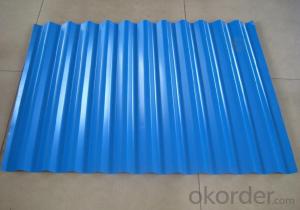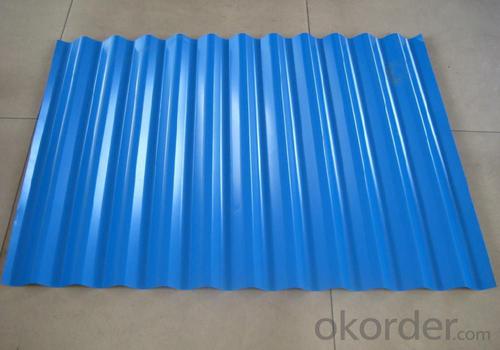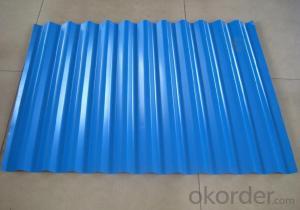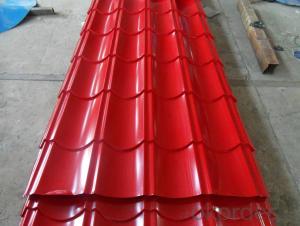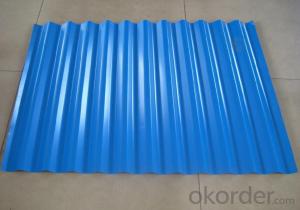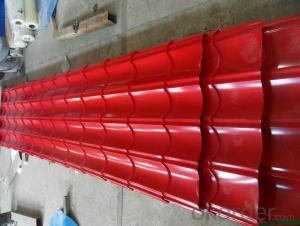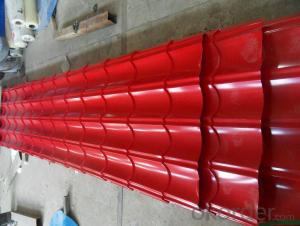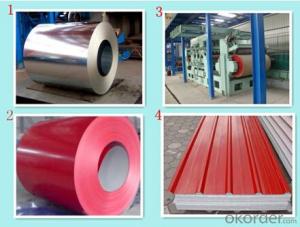Pre-Painted Galvanized/Aluzinc Steel Roof with Different Color
- Loading Port:
- Tianjin
- Payment Terms:
- TT OR LC
- Min Order Qty:
- 50 m.t.
- Supply Capability:
- 10000 m.t./month
OKorder Service Pledge
OKorder Financial Service
You Might Also Like
1. Pre-Painted Galvanized/Aluzinc Steel Roof Description:
With GI as base material, after pretreatment (degrease and chemical treatment ) and liquid dope with several layers of color, then after firing and cooling, finally the plate steel is called pre-painted galvanized (aluzinc) steel. Pre-painted galvanized roof is good capable of decoration, molding, corrosion resistance. It generally displays superior workability, durability and weather resistance.
2.Main Features of the Pre-Painted Galvanized/Aluzinc Steel Roof:
• Excellent process capability
• Smooth and flat surface
• Workability, durability
• Excellent heat resistance performance
• High strength
• Good formability
• Good visual effect
3.Pre-Painted Galvanized/Aluzinc Steel Roof Images
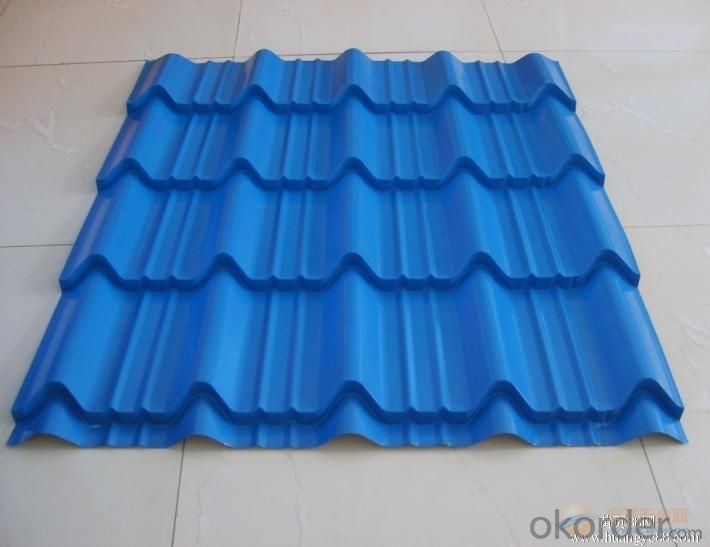
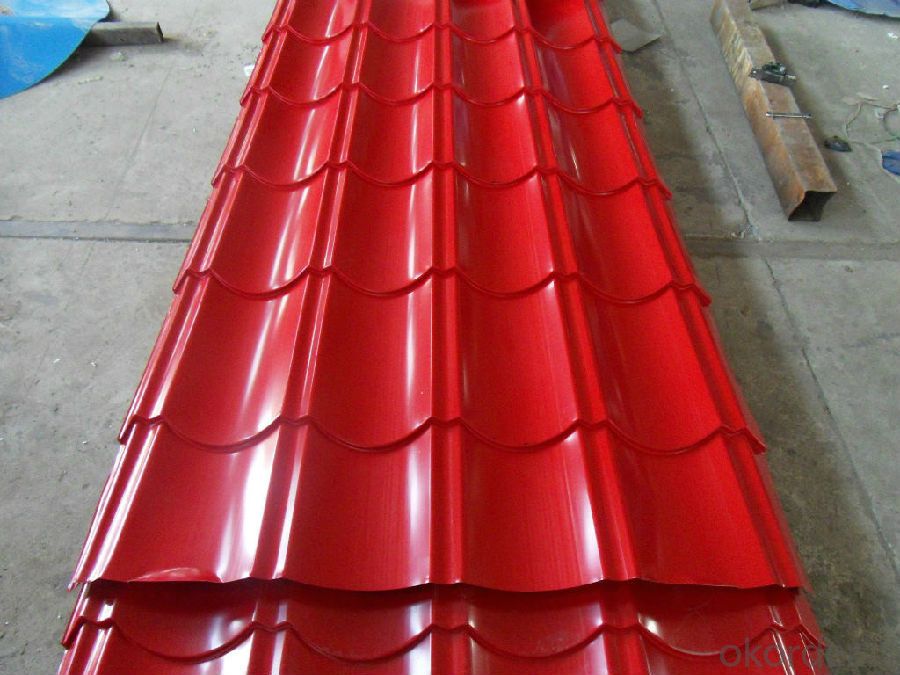
4.Pre-Painted Galvanized/Aluzinc Steel Roof Specification
Standard: AISI, ASTM, BS, DIN, GB, JIS
Grade: SGCC SGCH SGCD DX51D
Thickness: 0.13-3.0mm
Model Number: AISI, ASTM, BS, DIN, GB, JIS
Surface Treatment: Galvanized, anti-finger,
Application: Container Plate,panel sandwich
Width: 30-1500mm
Length: any length
color: RAL color
5.FAQ of Pre-Painted Galvanized/Aluzinc Steel Roof
What’s the brand of the paint?
We use the best brand of all of the word—AKZO.
What’s the wet and heat resistance of the roof?
More than 1000 hours.
What’s the basic material of this product?
Galvanized/Aluzinc Steel
What’s the coating composition of Hot-Dip Galvanized Steel Coil?
The coating composition is 55% aluminium in weight ratio, 43.4% zinc, and 1.5% silicon, with excellent corrosion and heat resistance performance.
- Q: I just purchased this Benchmade knife with m390 steel blade and it cost me a fortune but I wanted to know if this new steel is a tool steel. what classifies a tool steel. M390 = 1.9 carbon, 20. chromium, .30 manganese, 1. molybdenum, .60silicon, .60 tugsten, 4. vanadium at 60-62 HRC
- Which has better songs - Number Of the Beast Which has better riffs - British Steel Which has better solos - Number of The Beast Which has better vocals - Number of the Beast Which has a cooler cover - Number of the Beast Which do You prefer - This is a real thinker, almost like Sophies Choice Metal edition. But I have owned Number and the Beast longer than I have owned British Steel. So I go with Iron Maiden Both albums get a perfect 10 because they deserve it, both have great musicianship and both have great vocals
- Q: What are the advantages of using hot-rolled steel coils?
- Hot-rolled steel coils have several advantages. Firstly, they are produced at high temperatures, resulting in a more malleable and ductile material that can be easily shaped and formed. This makes hot-rolled steel coils ideal for a wide range of applications, such as construction, automotive, and machinery manufacturing. Additionally, the hot-rolling process enhances the mechanical properties of the steel, including increased strength and toughness. Moreover, hot-rolled steel coils have a lower cost compared to cold-rolled steel, making them a cost-effective choice for many industries.
- Q: What is the best butcher's steel around $20? I'm looking for a good tool to straight out some kitchen knives. thanks
- Butcher Steel
- Q: How are steel coils used in the production of steel springs?
- Steel coils are used in the production of steel springs as they serve as the raw material for creating the spring's structure. The steel coils are typically shaped and cut into the desired length and diameter to form the spring's body. The coils are then heated and tempered to provide the necessary strength and flexibility required for the spring's function. Overall, steel coils are integral in the manufacturing process of steel springs, providing the base material from which springs are formed.
- Q: How can the quality of steel coils be ensured?
- The quality of steel coils can be ensured through a combination of rigorous testing, adherence to industry standards, and effective quality control measures throughout the manufacturing process. This includes conducting various tests such as chemical composition analysis, mechanical property testing, and surface inspection to verify the integrity and durability of the steel coils. Additionally, implementing strict quality control protocols, regular inspections, and continuous improvement initiatives are essential to ensure consistent and high-quality production of steel coils.
- Q: What are the different types of steel alloys used in coils?
- Coils commonly employ various types of steel alloys, each possessing unique properties and characteristics. Some frequently used types include: 1. Carbon Steel: As the most fundamental and widely utilized steel alloy in coils, it boasts low carbon content and renowned strength and durability. Carbon steel coils find extensive application in areas demanding high strength, such as automotive parts, construction materials, and machinery components. 2. Stainless Steel: Comprising an iron, chromium, and other element alloy, stainless steel coils exhibit exceptional resistance to corrosion, formidable strength, and heat resistance properties. They are typically employed in scenarios where shielding against corrosion and staining is pivotal, such as kitchen appliances, medical equipment, and transportation components. 3. Galvanized Steel: Galvanized steel coils are formed by coating regular carbon steel with a layer of zinc, furnishing excellent corrosion resistance and safeguarding the underlying steel from rust. Commonly utilized in outdoor settings like roofing, fencing, and automotive body parts. 4. Alloy Steel: Alloy steel coils are manufactured by incorporating diverse alloying elements like manganese, nickel, chromium, or molybdenum into carbon steel, thereby enhancing the steel's strength, hardness, and wear resistance. These coils frequently find application in industries necessitating high strength and toughness, such as machinery, tools, and construction equipment manufacturing. 5. Electrical Steel: Electrically specialized steel coils are designed explicitly for employment in electrical equipment like transformers and electric motors. These coils possess low electrical resistance and high magnetic permeability, facilitating efficient electricity conduction and magnetic field generation. Typically constructed from a silicon alloy, which enhances electrical and magnetic properties. In conclusion, the selection of a steel alloy for coils hinges upon the specific requirements of the given application, encompassing factors like strength, corrosion resistance, electrical conductivity, and heat resistance.
- Q: How are steel coils used in the production of electrical equipment?
- Steel coils are used in the production of electrical equipment as they serve as the core component for transformers. The coils are made from high-quality steel to ensure efficient electrical conductivity and magnetic properties. They are wound around a core to create an electromagnetic field that helps in the transformation of voltage levels, enabling the smooth transmission and distribution of electricity.
- Q: What are the applications of stainless steel coils?
- Stainless steel coils have a wide range of applications across various industries due to their unique properties and characteristics. Some of the key applications of stainless steel coils include: 1. Manufacturing industry: Stainless steel coils are extensively used in the manufacturing sector for the production of various products such as automotive parts, kitchen appliances, machinery components, and construction materials. The high corrosion resistance and durability of stainless steel make it an ideal choice for these applications. 2. Construction industry: Stainless steel coils are widely used in the construction industry for applications such as roofing, cladding, structural supports, and reinforcement. The strength, resistance to harsh weather conditions, and aesthetic appeal of stainless steel make it a popular choice in architectural designs. 3. Food processing industry: Stainless steel coils are commonly utilized in the food processing industry for equipment such as food storage tanks, conveyors, and processing machinery. Stainless steel's hygienic properties, resistance to corrosion, and ease of cleaning make it suitable for maintaining the purity and safety of food products. 4. Chemical industry: Stainless steel coils find extensive usage in the chemical industry due to their excellent resistance to corrosion from chemicals and harsh environments. They are used in the production of storage tanks, pipelines, and reactors that handle various chemicals and corrosive substances. 5. Energy industry: Stainless steel coils are widely employed in the energy sector for applications such as power generation, oil and gas exploration, and renewable energy systems. They are used in heat exchangers, turbine components, pipelines, and offshore structures due to their high resistance to corrosion, strength, and longevity. 6. Medical and pharmaceutical industry: Stainless steel coils are commonly used in medical and pharmaceutical applications due to their biocompatibility and resistance to corrosion. They are used in the production of surgical instruments, medical implants, and medical equipment that require sterilization and durability. 7. Automotive industry: Stainless steel coils are utilized in the automotive sector for various components like exhaust systems, fuel tanks, catalytic converters, and structural parts. Stainless steel's high heat resistance, strength, and resistance to corrosion and oxidation make it suitable for these applications. These are just a few examples of the wide range of applications of stainless steel coils. Their versatility, durability, and resistance to corrosion make them indispensable in numerous industries where reliability and longevity are crucial factors.
- Q: What is the standard thickness of steel coils?
- The standard thickness of steel coils can vary depending on the specific application and industry. However, common thickness ranges for steel coils typically fall between 0.015 inches (0.38 mm) and 0.125 inches (3.17 mm).
- Q: Why can't the coil weight be too low?
- Because the steel coil is stored in warehouse stacking level, if the coil weight is too low, resulting in a single coil capacity is reduced, so that the steel roll easily crushed and deformed;
Send your message to us
Pre-Painted Galvanized/Aluzinc Steel Roof with Different Color
- Loading Port:
- Tianjin
- Payment Terms:
- TT OR LC
- Min Order Qty:
- 50 m.t.
- Supply Capability:
- 10000 m.t./month
OKorder Service Pledge
OKorder Financial Service
Similar products
Hot products
Hot Searches
Related keywords
